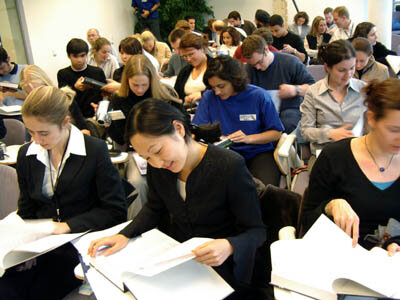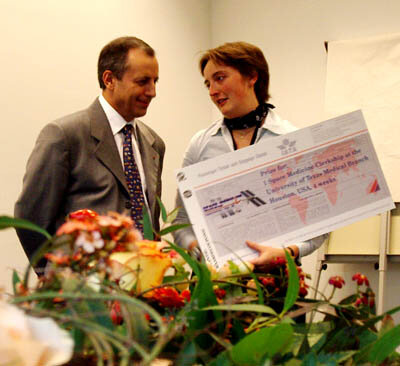Space medicine - students meet the experts
A long duration mission onboard the International Space Station or a future visit to Mars, could mean astronauts spending up to two years travelling and living in space.
How will they cope with living in zero gravity and in a confined space for such long periods, what effect will it have on their mental and physical health, and what happens if they become ill during the mission? Last week’s Space Medicine Workshop was designed to stimulate students to come up with answers that could improve the quality of life in space as well as on Earth.
The workshop, held at ESA’s European Astronaut Centre (EAC) in Cologne, Germany was organised by ESA’s European Astronaut Centre and the Education Office with the support of the European Medical Association. Present were space medicine experts, scientists and astronauts, and 45 students mainly from Europe.

The idea behind the workshop was to encourage a two-way exchange between experts and students. The experts, from prestigious universities and space centres around the world, have first-hand knowledge of space medicine but students can come up with new ideas on how to improve life in space for astronauts - ideas that can also improve life on Earth.
According to one of the experts, Dr Cardinale of Aberdeen University, UK, “the workshop is a good opportunity to increase awareness of biomedical problems related to human space missions. We hope to stimulate a new generation to think about using space missions for scientific purposes with Earth-based applications.”
Students were selected to attend the workshop on the basis of a detailed proposal endorsed by their university professor. The proposals had to fit into one of the following themes:
- psychology/human behaviour/performance
- human factors/ergonomics/medical technology
- nutrition/supplements
- countermeasures against the effects of space flight
At the week-long workshop students were invited to present their proposals to their colleagues and a panel of experts. The workshop organisers were delighted by the variety and range of proposals received. Filippo Ongaro of ESA’s European Astronaut Centre reports, “The panel of experts was impressed by the high quality and the originality of the proposals received, and by the professional way in which they were presented”.

The innovative ideas put forward ranged from studies on salt intake as a countermeasure to fluid volume depletion in space to GAIA, an idea for global adaptive indoor atmosphere.
During the week ESA also took the opportunity to introduce students and experts to the European Health Care Network that is being set up by EAC. The workshop also served as a pilot project for the Network, a joint undertaking of ESA’s Human Spaceflight and Industrial Matters and Technology Directorates. It is hoped that this biomedical technology transfer centre will optimise knowledge and technology transfer between space and Earth medicine, to improve the development and spin-off from medical technologies.
Awards for best proposals

At the end of the week the experts had the difficult job of evaluating all the proposals. The criteria used were innovation, feasibility, structure, compatibility with existing space programmes and applicability to both space and Earth scenarios.
The award for the best proposal went to Regina Egelhofer of the Technical University of Munich for her M-Grace proposal. This is an idea for a spacesuit that will allow astronauts to exercise while working in space. Her prize was an all-expenses-paid four-week course in aerospace medicine at the medical branch of the University of Texas in Galveston, USA. The second and third prizes – a visit to the IAF 2004 Congress in Vancouver, Canada - went to Mei Ling Doery from the University of Melbourne, Australia for her proposal on intermittent hypoxic training and to Thibaut Girard from Supaero France for his proposal for a malaria information system for the prediction and monitoring of epidemics.

A surprised and delighted Regina Egelhofer said, “The workshop provided an incredibly widespread overview on various medicine issues. Particularly for me, as a student from a technical university, this has been a very unusual chance to get in touch with the field”.
The workshop organisers, experts and students agreed that the workshop had been a valuable experience that should be repeated. Filippo Ongaro said “given the success of the workshop we hope to repeat this event every two years and to combine theoretical aspects with hands-on activities. As an early outcome of the workshop, and on the student’s initiative, a web-based forum on space medicine has been already set up so that all the participants can continue to exchange ideas and opinions”.




